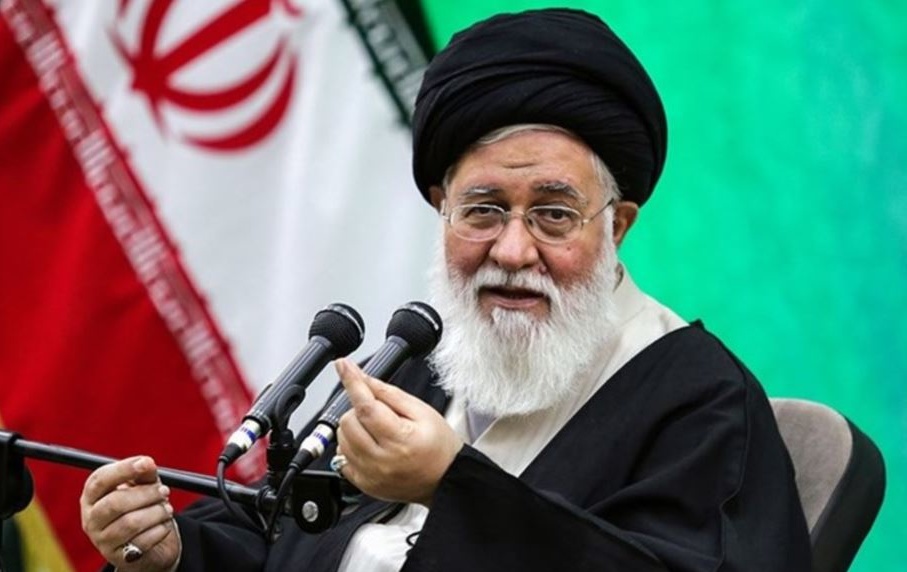Ayatollah Ahmad Alamolhoda delivering the Friday Prayer in Mashhad, Iran, May 17, 2019 (Tasnim)
As the Trump Administration debates confrontation with Iran, the Islamic Republic’s leaders are presenting an image of restraint.
Friday Prayer leaders across the country, guided by the Supreme Leader’s office, used sermons to downplay conflict.
In Iran’s second city Mashhad, Ayatollah Ahmad Alamolhoda repeated the line set by the Supreme Leader on Wednesday, “We are not the kind of people to start a war, and the United States too, does not deem a war to be in its interest.”
Alamolhoda said that tensions have entered a “new phase”, but a military showdown is not likely to break out “easily”: “The war posture taken by America including its economic pressures on Iran are simply meant to intimidate Iran.”
Friday Prayer leaders in Semnan and Tabriz combined the Supreme Leader’s mix of assurance and proclamation of the Islamic Republic’s strength: “There will not be a war as the United States is not capable to fight us.”
The sermons complemented Thursday’s assertion by
Foreign Minister Mohammad Javad Zarif, speaking on a four-country tour of Asia, that Tehran is showing “maximum restraint”: “We believe that escalation by the United States is unacceptable and uncalled for.”
No Negotiations
But the clerics also echoed Ayatollah Khamenei’s Khamenei’s rejection of negotiations with the US as “poison”.
Ayatollah Alamolhoda said in Mashhad, “What should we negotiate about? They tell us not to develop missiles and to abandon the ones we have already manufactured because they have a minimum range of 2000 kilometers.”
He added the warning, “All the U.S. assets in this region are within the range of our missiles. Its favorite friend in the region, Israel, is also within range.”
In Ahvaz, Abdolnabi Mousavi Fard said individuals who promoted the “miserable act” of negotiations were “US agents”.
Friday Prayer leaders in Qom and Gorgan warned that the Trump Administration’s sanctions seek unrest in Iran’s streets.
Earlier this week Trump — with his affinity for photo-opportunity summits such as that with North Korea’s Kim Jong-Un — said he would provide phone numbers for Iranian leaders to call and set up talks.
On Friday, a senior Administration official told reporters, “We’re sitting by the phone” — a quote eagerly circulated by Iranian State outlets.
State media also headline US reports that Trump has stepped back from military measures, undercutting his hawkish National Security Advisor John Bolton.
Economic Focus
Meanwhile, Foreign Minister Zarif continued his international tour seeking to relieve pressure on Iran’s troubled economy amid the comprehensive and expanding US sanctions.
In the past week, Zarif has been in Turkmenistan, India, Japan, and China. He said from Beijing on Friday — accompanying a tweet with smiling photos of his handshake with Chinese Foreign Minister Wang Yi — that the international community must “make sure the Iranian people enjoy the benefits of the JCPOA [2015 nuclear deal] with concrete actions”.
Wang Yi accommodated Zarif, “China resolutely opposes the US implementation of unilateral sanctions.”
In the past month, the US has tightened its sanctions by designating the Revolutionary Guards as a “foreign terrorist organization” and by ending sanctions waivers to Iran’s top oil customers such as China, Japan, and India.
An Iranian attempt to bypass the sanctions, through an agreement with Europe on a mechanism for non-dollar trade, has failed. Tehran rejected “humiliating conditions”, such as European criticism of Iran’s missile program, on the Special Purpose Vehicle for Iranian oil and other commodities and goods.
Iran Daily, March 5: Supreme Leader Closes Door on Links with “Vicious” Europe

